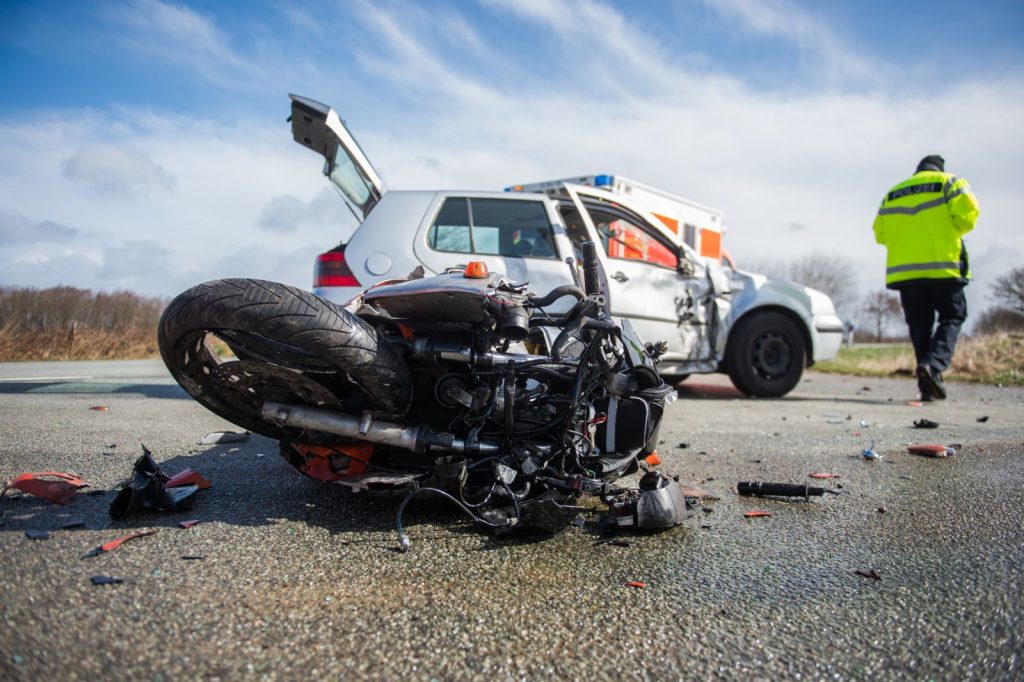Riding a motorcycle as an alternative form of transportation can be one of the most rewarding experiences. Many people enjoy the rush of freedom and flexibility as well as the sense of adventure that driving motorcycles offers. Over the years, it has turned from simply a mode of transportation to a lifestyle with its own following all across the globe.
Despite the many benefits, riding motorcycles does come with a certain level of risk. The National Highway Traffic Safety Administration found that motorcyclists involved in a motor vehicle traffic crash are approximately 28 times more likely to die when compared to passenger car occupants. The sheer size and weight difference between a motorcycle and other vehicles on the road can contribute to the severity of injuries in the event of an accident. The primary reason for the increased risk is that motorcyclists are less protected than those in a car. While it’s impossible to completely eliminate risks while riding a motorcycle, being more aware of the dangers can help you make safer choices while on the road.
What Are Common Reasons Why Motorcycle Accidents Happen?
Many factors contribute to the risk of injury or death in a motorcycle accident.
Common causes include:
- Speeding or driving too fast for conditions: This is one of the most common factors in motorcycle accidents. Many riders fail to account for the fact that it can take longer to stop a motorcycle than it does a car, especially in wet or icy conditions.
- Impaired driving: This includes driving under the influence of drugs or alcohol, as well as being tired or distracted. It’s important to be highly sensitive to your surroundings and be able to react quickly when necessary, which can be difficult to do when you’re not fully focused on the task at hand.
- Lane splitting: This involves a motorcycle rider driving between two lanes of traffic, often to get ahead in traffic. It can be extremely dangerous, as it leaves the rider vulnerable to being hit by a vehicle that may not see them.
- Reckless driving: This can encompass a variety of dangerous behaviors, such as tailgating, weaving in and out of traffic, or changing lanes without signaling. All of these behaviors put both the driver and others on the road at risk.
- Poor road conditions: This includes everything from potholes to debris in the road. Be aware of potential hazards and take them into account when riding, as they can cause even the most seasoned driver to lose control of their motorcycle.
- Failure to yield: This is one of the most common causes of accidents at intersections. Many drivers fail to see or misjudge the speed of oncoming motorcycles, which can result in a collision.
- Not wearing a helmet: While it is not against the law in all states, not wearing a helmet dramatically increases the risk of sustaining a serious brain injury in the event of an accident. This is because helmets protect riders from head injuries by absorbing the impact of a crash. When you don’t wear a helmet, the risk of sustaining a traumatic brain injury is much higher.
Many different factors can contribute to the risk of a motorcycle accident. Being aware of these commonly found dangers on the road can help you make safer choices while riding and ultimately help to prevent accidents from happening.
Ways to Reduce the Risk of a Motorcycle Accident
There are a few key things you can do to help reduce the risk of being involved in a motorcycle accident.
- Always wear a helmet: As we mentioned before, helmets are incredibly important in protecting riders from sustaining a serious brain injury. The Centers for Disease Control and Prevention reports that wearing a helmet can reduce your overall risk of a fatal motorcycle experience by 37 percent. These protective headpieces can help to save your life in the event of an accident, so it’s always recommended to err on the side of caution and wear one whenever you’re riding.
- Make sure you are as visible to other drivers as possible: This means wearing bright clothing during the day and using reflective gear or lights at night. It’s also a good idea to avoid riding in a driver’s blind spot. Motorcyclists should not assume that other drivers can see them, so it’s important to take measures to make yourself as visible as possible.
- Be aware of your surroundings and avoid distracted driving: This means not only avoiding things like texting while you’re riding but also being aware of what’s going on around you. Pay attention to other drivers and be prepared to take evasive action if necessary. It’s best to assume that other drivers will not see you and act accordingly.
- Obey the speed limit and drive defensively: Speeding is one of the most common causes of motorcycle accidents. Obeying the speed limit and driving at a safe speed for the conditions can help you avoid an accident. Additionally, driving defensively can help you anticipate the actions of other drivers and be prepared to take evasive action if necessary. While you cannot control how other drivers behave, driving defensively can go a long way in helping you counteract someone else’s recklessness.
- Take a motorcycle safety course: Many states offer motorcycle safety courses that can teach riders the basics of safe riding. These courses can provide valuable information on everything from proper braking techniques to how to avoid common accidents. Taking a motorcycle safety course is a great educational opportunity to brush up on your skills and become a safer rider.
- Make sure your motorcycle is in full functioning condition: This means regularly checking the tires, brakes, and lights and getting any necessary repairs done promptly. Before a long trip, it’s also a good idea to check your motorcycle thoroughly to ensure everything is in working order.
By following these motorcycle safety tips, you are taking control to reduce the risk of being involved in a motorcycle accident. However, even the safest riders can’t always avoid accidents. If you or someone you love has been injured in a motorcycle accident, contact an experienced Sacramento motorcycle accident lawyer from Guenard & Bozarth, LLP to discuss your legal options.


